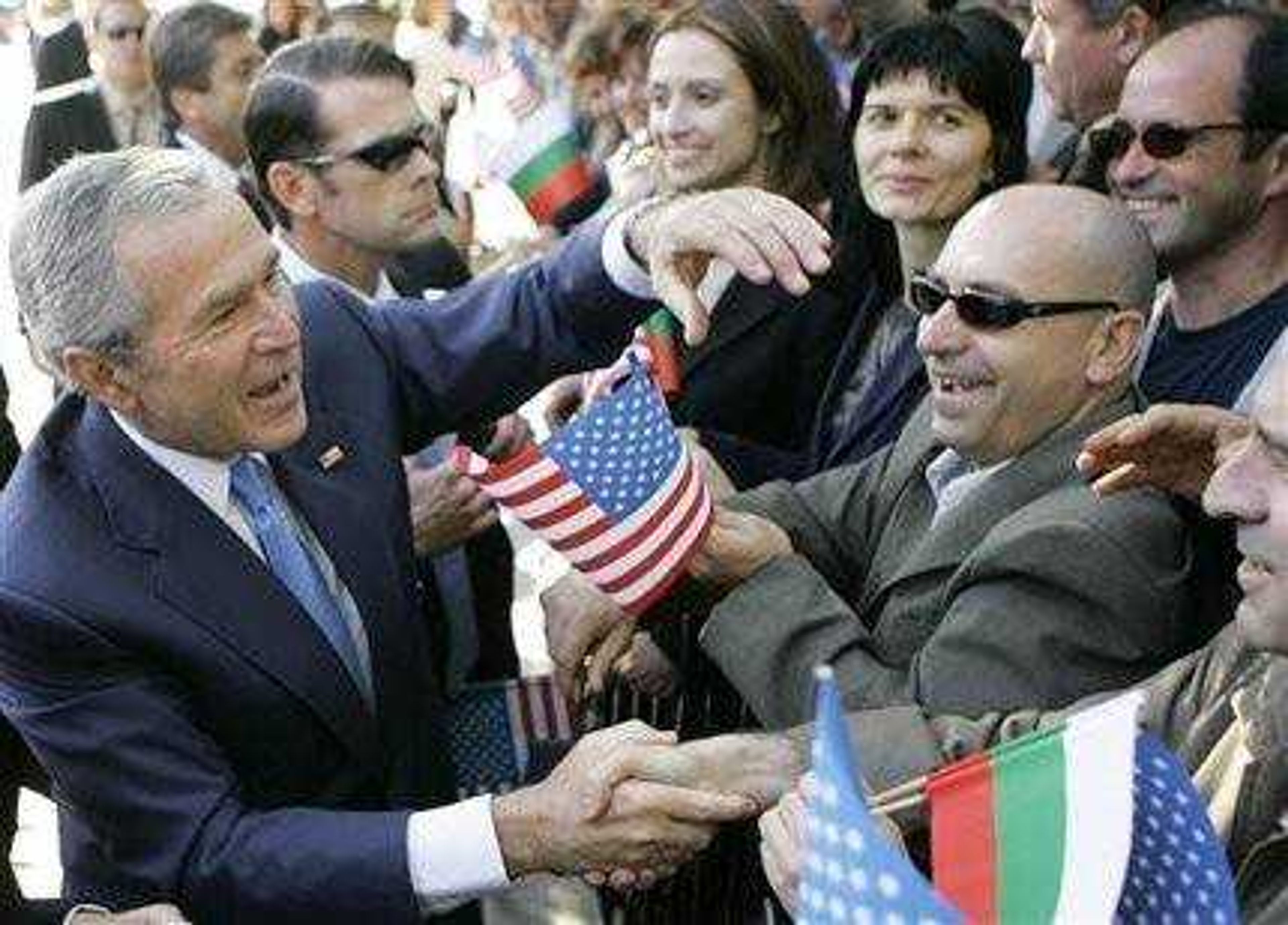Mr. Prez: You're not in Albania anymore
Tuesday, 12 June, 2007, 19:22 EDT, US In June 1963, President John F. Kennedy visited Berlin and thousands of people chanted his name, some with tears in their eyes, along his motorcade route. Kennedy famously uttered his "ich bin ein Berliner" (I am a Berliner) speech to residents of a beleaguered city ready to make an emotional connection with the charismatic U.S. leader...
~As President Bush settles back into life inside the Beltway, PAUL CHAVEZ examines the lingering impact of overseas trips by American presidents.
In June 1963, President John F. Kennedy visited Berlin and thousands of people chanted his name, some with tears in their eyes, along his motorcade route.
Kennedy famously uttered his "ich bin ein Berliner" (I am a Berliner) speech to residents of a beleaguered city ready to make an emotional connection with the charismatic U.S. leader.
Fast forward some 44 years later to President Bush, who was mobbed Sunday by Albanians who shook hands, grabbed him by the arms and wrists, hugged him and even rubbed his head.
Bush returned from the rock star-like welcome in Albania to a cooler reception on Capitol Hill, where he made a rare lunch visit to sway the Senate's GOP membership to support his immigration reform bill.
The two trips are in stark contrast, said Matthew Beckmann, an assistant professor of political science at the University of California, Irvine.
"There probably is a circumstance in which a presidential trip overseas could have lingering domestic consequences that could influence Congress and the public," Beckmann said. "But this isn't one of them."
___
RIGHT PLACE, RIGHT TIME
Kennedy made his dramatic speech to assure West Berliners -- surrounded by walls and communist East Germany at the time -- that the United States wouldn't abandon them in a crisis. The speech came when the world had a more positive view of the United States, before the Vietnam War and the student protest movement of the 1960s.
"The moment crystallizes and resonates with what people were already thinking and taps both in Washington and in the public that what the president is doing is right," Beckmann said.
Contrast that with Bush, who is saddled with low approval ratings at home and heavily criticized in some countries over the war in Iraq.
"Even if this little trip is in the context of a broader view, it just gets drowned out by the negativity from Iraq and everything else," Beckmann said. "Any good news these days is good for the Bush administration, but this is small and overwhelmed by the tidal wave going against them."
___
TRIP IMPACT
President Ronald Reagan helped cement his anti-communism credentials when he visited the Berlin Wall and urged Soviet leader Mikhail Gorbachev to "tear down this wall."
Reagan's speech on June 12, 1987, was delivered in front of the Brandenburg Gate and the wall that had divided Berlin since 1961. Less than 2 1/2 years after the speech, the wall came tumbling down.
Reagan and President Bill Clinton were skilled at building political capital from their overseas trips, said Nancy Snow, a professor of communications at California State University, Fullerton.
"Clinton was good at promoting U.S. involvement in the global economy and showing that we were a nation that wanted to engage with the world," Snow said. "President Bush really seems uncomfortable going abroad. ... You know things aren't going well when you have to go to Albania to have people take to the streets and cheer you."
In 1972, President Richard M. Nixon visited communist China -- opening the first door toward normal relations between Beijing and Washington. Nixon's visit was preceded by about a year by the U.S. table tennis team's visit to Beijing -- the first in a series of visits known as "pingpong diplomacy."
"Nixon's bona fides on anti-communism were unimpeachable -- an ironic choice of words," Beckmann said. "And so he had the armor to go in and actually work with China and not be accused of being soft on communism. That trip was a huge deal in opening doors in China and one of the rare cases in which it changed the way people thought of things."
___
Paul Chavez is an asap reporter based in Los Angeles.
___
Want to comment? Sound off at soundoffasap@ap.org.
©2007 The Associated Press. All rights reserved. This material may not be published, broadcast, rewritten or redistributed.
Connect with the Southeast Missourian Newsroom:
For corrections to this story or other insights for the editor, click here. To submit a letter to the editor, click here. To learn about the Southeast Missourian’s AI Policy, click here.









